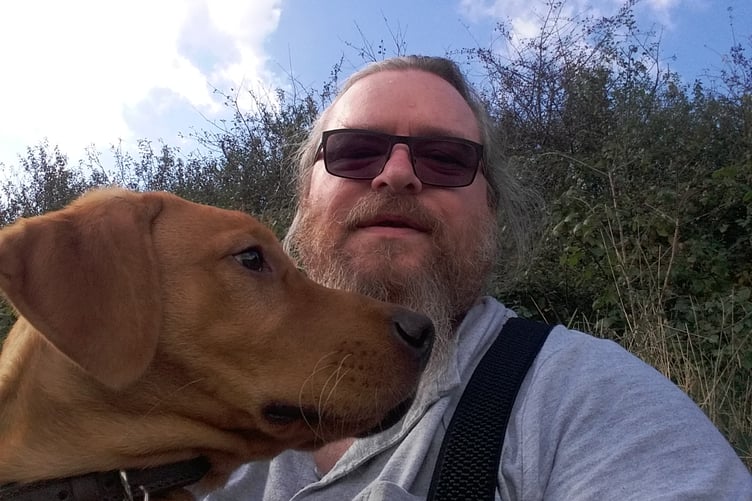A FORMER investment banker who had his life turned upside down by a medical condition has revealed how he has managed to live with it.
Russell Fleming, from Camelford, developed Myalgic Encephalomyelitis (ME), also known as Chronic Fatigue Syndrome (CFS) aged 29 after contracting a virus which caused seizures while on holiday abroad.
ME is a neurological illness that is characterised by a debilitating fatigue and other symptoms which are often worsened with physical or mental exertion but do not fully improve with rest.
At its worst, it left him bed-bound but 25 years after his diagnosis, he has shared the story of how he learned to live and adapt with the illness and now works for The ME Association as the head of project development after initially joining as a volunteer.
Mr Fleming said: “I had joined Lloyds Private Banking from College and transferred to Jersey as part of a senior management development programme. I specialised in investment management and managed private client portfolios. Aged 29, I had a good social life and was physically in my prime, running each day along the beach before work. In 1999 I took a last-minute holiday abroad with friends. It was incredibly hot and we played a lot of beach volleyball. Towards the end of the break, I became acutely ill with an infection that led to seizures and from which I never fully recovered.”

Going from having a high-flying career in the banking industry to being bed bound was something that Russell found hard to deal with, and while he attempted to return to life as it was prior to being unwell, he wasn’t able to function as previously due to the impact of the condition on his health and wellbeing.
He continued: “My career was everything to me and being unable to sustain a return to work had a major impact on my mental health as well as on my independence. I was never lacking motivation; it was my ability that had suffered. I couldn't function to the same extent cognitively or physically. My life experience dictated that infections were short-lived and resulted in a full recovery.
“Nobody prepared me for a life of chronic ill-health. In 2022, I accepted a disability pension, which at the time served only to increase my despair. The physical impact of ME/CFS led to long months of being unable to rise from bed and there was little medial help available.
“I didn't learn to manage my symptoms very well and would try to push through even when my body was screaming not to. This led to a very erratic period of relapse and relative remission that persisted for a long time. It took ten years before my symptoms would stabilise and eventually start to improve.”
However, the condition isn’t always universally understood or managed sufficiently within the main NHS system, something The ME Association campaigns to raise awareness of.
Eventually, Russell found himself moving back with his parents in Cornwall, where he would live until 2015. He said: “My parents repatriated me to Cornwall, and I lived with them until 2015. There was very little medical help available in those early years. GPs would do their best, as would counsellors, but it was a post-code lottery. I chased any and all supposed 'treatments' and spent a lot of money trying to dig myself out of the hole, to no avail.
“I then happened to be referred to Professor Antony Pinching who specialised in immunology and had an interest in post-viral conditions and ME/CFS. He was the first person I'd met who understood. He validated what I had been experiencing. He was also able to prescribe a drug that reduced the nausea and vertigo and contributed to stabilising my symptoms more generally.
“I then had a referral to Cornwall's ME/CFS specialist service and access to professionals who helped me learn how to live with the limitations of ME/CFS and improve the quality of my life.”
ME left Russell feeling as if he had lost his identity, with tasks many might take for granted, such as going for a walk leaving him feeling debilitated and disabled. In turn, combined with a loss of cognitive ability meaning even reading words on a page became a challenge, it led to feelings of anger, grief and blame, particularly when trying to ‘fight’ for access to treatment.
However, due in part to his determination and the support of people around him, Russell has now been able to work around his condition as the head of project development for The ME Association, something that came after relapses in his condition disrupted his attempts to finish university or work elsewhere.
He said: “The big difference for me is that I have achieved all of this by working from home. I couldn't do this if I had to work in an office and commute. The charity are flexible employers which means if my symptoms are bad, I can adapt my working week.
“Restless sleep tends to mean I start work early at 7am and work until 2pm unless I have later meetings. I choose to work and to do so means that I have a support system around me. I have a housekeeper, a gardener, and parents who are minutes away. I finally have a dog, Buster, and if I am unable to take him for a walk, I have people around me who can.”
He added: “It robs a person of their vitality and identity. There are large numbers of people who are unable to recover fully from an infection. Providing appropriate care and support has become a real concern and something that The ME Association and others are working hard to address with the Department of Health and Social Care. Society is more aware of these chronic conditions than at any time in history. The ME Association will continue to provide support, advocate for healthcare improvements and invest in medical research. More research is needed if we are ever to develop preventative measures and effective treatments.”




Comments
This article has no comments yet. Be the first to leave a comment.